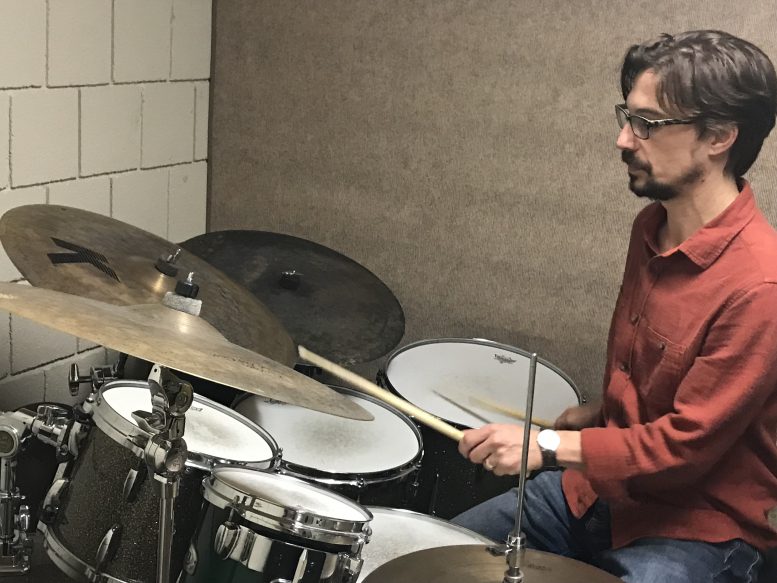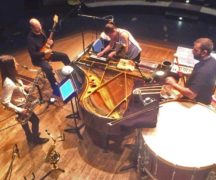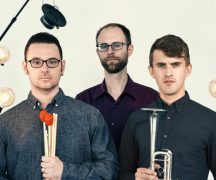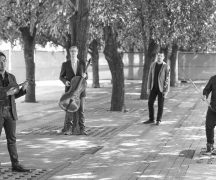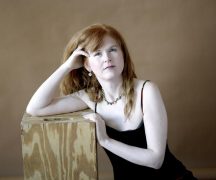By DAVID DUPONT
BG Independent News
Dan Piccolo has been banging on drums since he was in junior high.
“I know the drum set backwards and forward since playing in my parents’ attic,” said the assistant professor of percussion at Bowling Green State University.
On Thursday as part of the New Music Festival on campus, Piccolo will take the drum set into new territory. During the 7:30 p.m. concert in Kobacker Hall, Piccolo will debut “Impulse Control” by Evan Ziporyn. The piece is a concerto for drum set and wind ensemble.
The drum set is an old friend, now “I get to play this crazy music on it,” he said.
Ziporyn is this year’s featured guest composer. “Impulse Control” was written for the festival.
Piccolo, 40, got to know Ziporyn’s work when he was finishing up his work on his doctorate at the University of Michigan. He’d spent a number of years studying the Indian hand drum the tabla, and wanted to feature it on his final doctoral recital in spring, 2015.
He found Ziporyn’s “Mumbai” for tablas accompanied by small string orchestra and percussion. Unlike other works for tabla and orchestra, this did not simply transfer Indian musical styles into the symphonic realm but rather but created an entirely different soundscape true to Ziporyn’s vision.
Piccolo and Ziporyn corresponded in the course of the preparation for the performance — the first since its debut — and the composer even lent Piccolo some of the specialized percussion instruments called for in the piece.
During that time Piccolo conceived of the idea of having Ziporyn compose a concerto for percussion for him. The timing always seemed off, until Piccolo started talking to Kurt Doles, the director of the MidAmerican Center for Contemporary Music, which organizes the festival.
With Ziporyn booked as featured guest composer, they worked up a way to pay for a commission through the center’s funds, help from the university’s wind ensemble, and a small consortium of other universities.
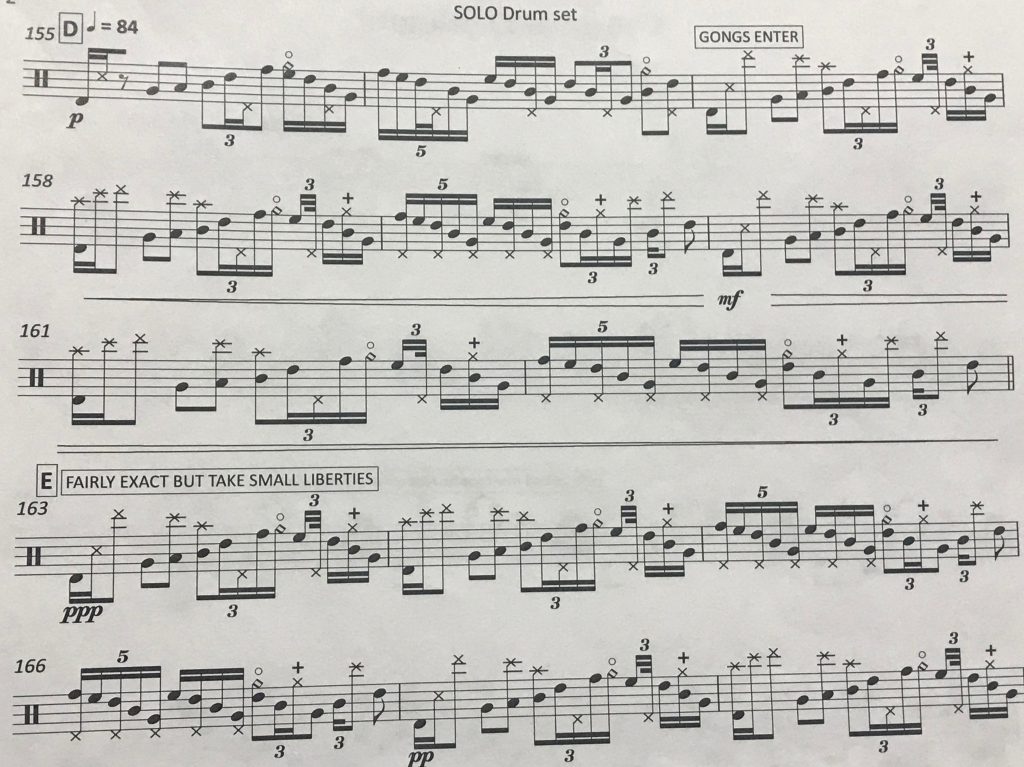
That was about two years ago. At first Piccolo imagined a piece for concert percussion with the stage full of an assortment of instruments. As the percussionist and composer talked they focused in on the drum set. That’s what Piccolo has played the longest, and Ziporyn said it’s the percussion instrument he’s had the most relationship with. “So much of the music I love, that everybody loves, has had drum set in it,” he said in a recent telephone interview. “I love the drum set. It exemplifies the personality of the player.”
Drum set has a long lineage of great musicians who have put their stamp on the instrument, but Ziporyn said he wanted to start “with a blank slate.”
He knew given “the great lengths” Piccolo had gone to perform “Mumbai” that the percussionist had an affinity with his work.
The piece was written and first performed by Indian master Sandeep Das. “It impressed me that Dan would figure out his own way.”
They corresponded throughout the two years with Piccolo sending him videos of his improvising.
The first of the two movements pairs Piccolo with the percussion section, which amplifies the solo part.
Musical pitch is a form of rhythm, Piccolo noted. A pitch is just “a frequency of beats.” The faster the beats, the higher the pitch. Ziporyn plays with that by taking the rhythms of the first movement and then expressing them in tones in the second movement.
Ziporyn said the piece exploits percussion’s sharp attack and short decay. “That kind of controls everything else that’s going on other instruments.”
Writing for wind ensemble took Ziporyn back to his roots playing clarinet in band.
Wind orchestra offers a wealth of sonic opportunities and choices. Not only does it have trombones, but it has euphoniums. Not only does it have clarinets but saxophones.
The saxophone section plays an important role in “Impulse Control.”
When they were discussing the piece in the early stages, Ziporyn asked Piccolo how strong the college’s saxophone studio was. Very, Piccolo responded.
Piccolo said that in fourth grade his first choice of instrument was clarinet so he could then move to saxophone. But he did so well reading rhythms that he was started on percussion.
Growing up in Rochester, New York, he played in school band and youth orchestra. He went on to earn all three of his degrees from bachelor’s through doctorate at the University of Michigan, but because he took years off between, he studied with different faculty. “It was almost like going to three different schools.”
Between his bachelor’s and master’s he performed with Cloud Nine Music at venues around the world from bars to jazz festivals. When he went back for his master’s in jazz performance he got involved with the Afro-beat jam band Nomo, which recorded and toured internationally. Nomo played the Bowling Green scene, both at the Black Swamp Arts Festival and Howard’s Club H.
During that time Piccolo decided he wanted to earn money only through music. So he supplemented gigging with teaching at a music store and at Pioneer High School.
That experience reacquainted him with concert percussion ensemble. He liked teaching so much, he decided to get his doctorate.
On graduating, he came to teach at BGSU taking over the percussion studio following the death of beloved professor Roger Schupp. He’d met Schupp through his friend and musical collaborator Olman Piedra, who got his doctorate at BGSU and with whom he played in Nomo.
Piccolo recalls last seeing Schupp at the Percussive Arts Society International Convention in 2015. He hardly recognized Schupp. Schupp said his wife had questioned whether he was well enough to attend the convention. But Schupp insisted on going because it was probably his last.
He died a few weeks later.
From Schupp, Piccolo inherited a percussion studio populated by talented musicians and stocked with all the percussion toys needed to perform the contemporary sounds for which BGSU has become acclaimed.
Other percussionists come in and are impressed by the array of percussion, including three octaves on tuned gongs. “Roger took care of collecting things we need to play this crazy new music,” Piccolo said.
Ziporyn was aware of the festival’s reputation, and attended years ago. He also performed here with the Bang on a Can All Stars. He was a founding member of the new music collective.
The festival gives him the chance to hear a wide range of his pieces performed. His music, from pieces for a single instrument through music for orchestra, will be perform on six of the eight concerts. “You hear connections between them that normally you don’t get to hear,” he said.
He’s hoping that’s true of his newest work “Impulse Control” and his older piece for Indonesian gamelan and saxophone quartet which will be played Friday at 2:30 p.m. in Kobacker Hall.
“I hope to hear connections between these pieces and these genres,” he said.
Ziporyn concluded by saying it was an honor to be invited as featured guest composer “given the lineage of the festival and what it represents in music.”

